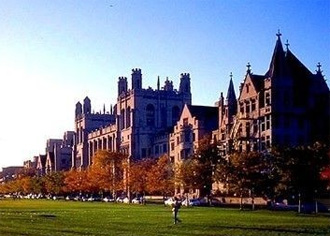“Think Independently” is the primary educational principle of Harvard University. Consciously, Harvard professors implement the principle in every specific teaching procedure. They point out clearly that their relationship with students is cooperative, rather than hierarchical. In class, Harvard professors’ mainly provide students with clues and references. Rarely will they give the answers directly. They see themselves as guides, promoters, and cothinkers, instead of knowledge-imparters and answer-providers. Harvard professors have been used to pointed and forthright questions and critiques. The students they like most are those who dare to and have the ability to challenge teachers. They also give these students the highest scores. Most professors even believe that the classes in which there is no challenge from students are the most boring and the most unsuccessful classes.
獨立思考是哈佛大學的第一教育原則。哈佛教授有意識地把獨立思考原則落實到 教學的每一個具體環節上。他們非常明確地指出,他們和學生的關系是合作關系,而 絕非等級關系。在課堂上,哈佛教授主要是提供思考的線索和參照,很少直接提供答案。 他們視自己為引導者、推動者和共同思考者,而不是知識傳授者和答案給予者。哈佛 教授們早就習慣了學生尖銳直率的質疑和批判,他們最喜愛的、給分最高的都是那些 敢于并有能力挑戰老師的學生。許多教授甚至覺得,沒有受到學生挑戰的課是最沉悶 無聊的課,也是最不成功的課。

Harvard students are used to this equal relationship between teachers and students as well, which in turn make them brave enough to challenge any authority. As professors appear to be “humble” in front of students, they are even the targets of students’ jokes. Harvard professors are human beings, and they like the feeling of being respected and adored. But “authority" cannot win respect. They believe that they must first encourage students to think independently and challenge authority, cultivate students’ skeptical spirits, and guide a variety of views to cross swords. Only by doing so can they create an atmosphere that is equal, free, and unfettered, can they evoke students,spirits of innovation and quest to the utmost extent, and win real respect from students. At Harvard, you’ll often see such a scene: when a professor has left,students keeps applauding until they think the professor cannot hear the applause any more.
哈佛學生也習慣了這種平等相待的師生關系,這習慣 又使他們敢于挑戰任何權威。因為教授在學生面前顯得很 “謙卑”,學生甚至可以開教授的玩笑。哈佛教授也是人, 也喜歡被人尊敬崇拜,但尊敬不是靠“權威”得來的。他 們認為必須首先鼓勵學生獨立思考和挑戰權威,滿懷熱情 地培養學生的懷疑精神并引導多種觀點交鋒,只有這樣, 才能創造平等、輕松、無拘無束的氛圍,才能最大限度地 激發學生獨立創造和探索的精神,也只有這樣才能真正贏得學生的尊敬。在哈佛經常 看到這一情景:教授走后,學生還在熱烈鼓掌,直到他們認為教授聽不到掌聲為止。
Plagiarism is the big no-no in teaching, research,and study at Harvard. Students are punished most severely for plagiarizing rather than for being late for class, damaging public property, or even fighting. To ensure academic independence, Harvard has formulated and carried out the famous “Three As Principle" namely “, Academic Freedom, Academic Autonomy and Academic Neutrality”. Only those scholars who are guaranteed security and freedom can explore scientific spirit.
抄襲和剽竊是哈佛教學、研究和學習的大忌。學生受到最嚴厲的懲罰,不是因為 遲到曠課、損害公物甚至打架斗毆,而是因為抄襲剽竊。為保證學術研究的獨立自主, 哈佛制定并嚴格執行了著名的“三A原則”,即“學術自由、學術自治和學術中立”。 只有具有安全和自由保證的學者才能探索科學精神的實質。











